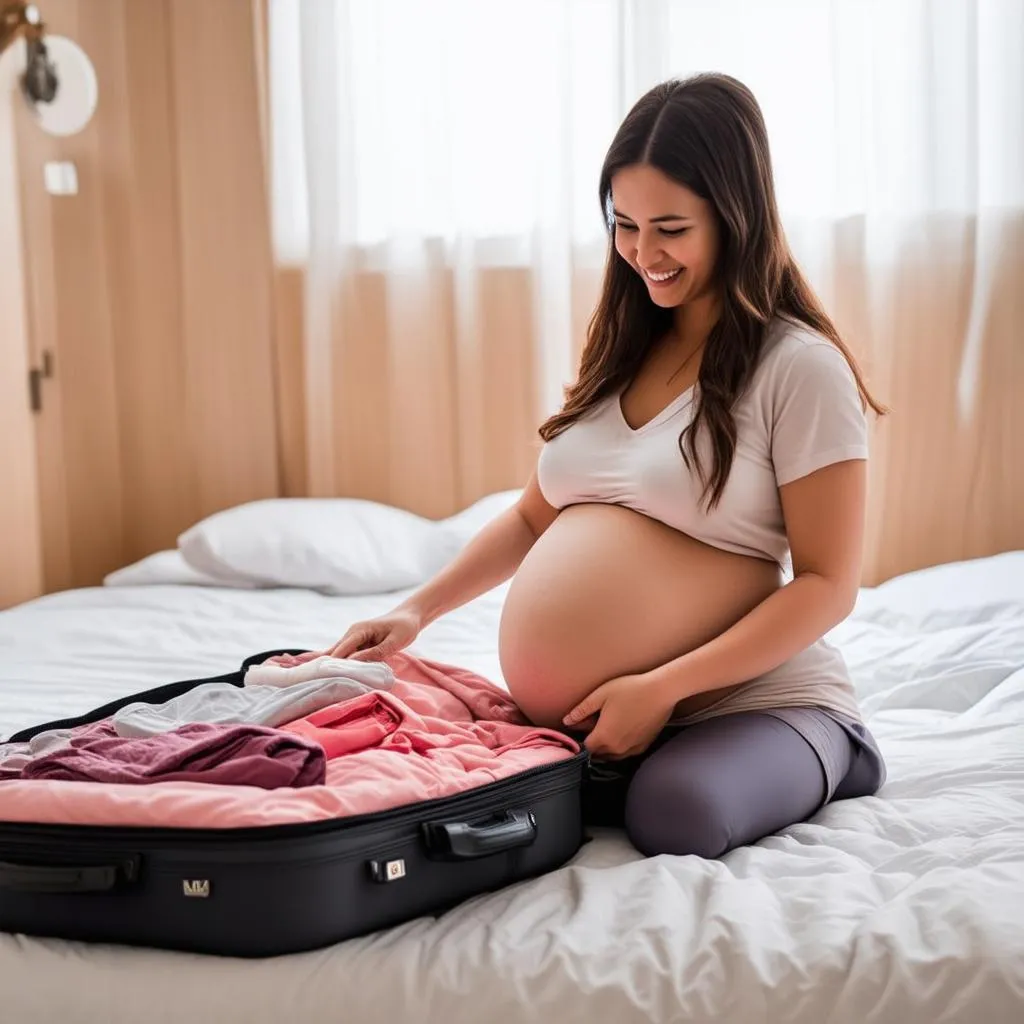Are you an adventure-loving mom-to-be wondering “when should I stop traveling while pregnant?” It’s a common question with no one-size-fits-all answer. Just as every pregnancy is unique, so is every woman’s comfort level with travel. However, understanding the general guidelines and potential risks can empower you to make informed decisions about your journey.
When is the Best Time to Travel While Pregnant?
Many expectant mothers find the second trimester (weeks 14 to 28) the sweet spot for travel. Morning sickness has typically subsided, energy levels are often higher, and the risk of complications tends to be lower.
Imagine strolling through the charming streets of Florence, Italy, indulging in delicious gelato without a care in the world – a perfect second-trimester escape!
But what about traveling in the first or third trimester? Let’s explore those scenarios.
First Trimester Travel
While the first trimester can be a time of excitement, it’s also when your body undergoes significant changes. Fatigue, morning sickness, and food aversions might dampen your travel spirits. Additionally, the risk of miscarriage is higher during this time.
However, if you’re feeling up to it and your healthcare provider gives you the green light, there’s no reason to completely rule out travel. Just prioritize short trips closer home, like a relaxing weekend getaway to a cozy cabin in the mountains.
Third Trimester Travel
As you approach your due date, travel generally becomes less appealing and potentially more complicated. The risk of premature labor or other complications increases, and you’ll likely experience more discomfort and fatigue.
Most airlines have restrictions on flying during the third trimester, typically requiring a doctor’s note after a certain week.
However, this doesn’t mean you need to be confined to your home. Consider exploring nearby attractions or embarking on a scenic road trip to a beautiful destination like Big Sur, California.
Remember, the key is to listen to your body and consult with your healthcare provider throughout your pregnancy. They can provide personalized advice based on your individual health and the specifics of your trip.
Factors to Consider When Deciding When to Stop Traveling Pregnant
Besides the trimester of your pregnancy, several other factors come into play:
- Your Health: If you have any pre-existing medical conditions or pregnancy-related complications, such as gestational diabetes or preeclampsia, your healthcare provider might advise against travel or recommend modifications.
- Your Destination: Traveling to remote areas with limited access to medical care might not be ideal during pregnancy. Consider destinations with readily available healthcare facilities and good sanitation practices.
- Mode of Transportation: Long flights or car rides can increase the risk of blood clots. Ensure you take frequent breaks to stretch, move around, and stay hydrated.
- Activities: Strenuous activities like scuba diving, hiking at high altitudes, or engaging in extreme sports are best avoided during pregnancy. Opt for more relaxing and pregnancy-friendly activities like gentle walks, swimming, or prenatal yoga.
Tips for Traveling Safely While Pregnant
Planning a trip while pregnant? Here are some tips to ensure a smoother and safer journey:
Before You Go:
- Consult Your Doctor: Schedule a prenatal checkup before your trip to discuss your travel plans and any potential risks or precautions.
- Pack Smart: Bring along essential items like comfortable shoes, compression socks, a pregnancy pillow, snacks, and a copy of your medical records.
- Research Your Destination: Familiarize yourself with the local healthcare facilities, pharmacies, and emergency contact numbers.
- Consider Travel Insurance: Look for insurance that covers pregnancy-related complications and unexpected events.
During Your Trip:
- Stay Hydrated: Drink plenty of water, especially when flying or traveling to hot climates.
- Move Regularly: Take breaks to stand up, stretch, and walk around to improve circulation and reduce the risk of blood clots.
- Listen to Your Body: Don’t hesitate to rest when you need to and adjust your itinerary accordingly.
- Communicate Your Needs: Inform airline staff, hotel personnel, and tour guides about your pregnancy so they can provide appropriate assistance.
 packing for a trip while pregnant
packing for a trip while pregnant
When to Stop Traveling Pregnant: Common Concerns and FAQs
Navigating travel during pregnancy can be overwhelming, but we’re here to address some common concerns and answer your frequently asked questions:
1. When is it considered too late to travel while pregnant?
There’s no specific cutoff point, but most healthcare providers advise against traveling after 36 weeks, especially for international trips. Airlines often have their own restrictions, so it’s crucial to check their policies in advance.
2. What are the risks of flying while pregnant?
While flying is generally considered safe during pregnancy, it does pose some minor risks, including:
- Blood Clots: Prolonged sitting can increase the risk of deep vein thrombosis (DVT). Wearing compression socks, staying hydrated, and moving around the cabin can help mitigate this risk.
- Dehydration: Cabin air is dry, so drink plenty of water to stay hydrated.
- Radiation Exposure: While cosmic radiation exposure during flights is minimal, frequent flyers might want to discuss this with their healthcare provider.
3. What precautions should I take when traveling to a foreign country while pregnant?
- Food and Water Safety: Be cautious about consuming unpasteurized dairy products, raw or undercooked meat, and tap water in certain regions. Opt for bottled water and thoroughly cooked food.
- Vaccinations and Medications: Consult your doctor about necessary vaccinations and medications for your destination. Some vaccines might not be safe during pregnancy.
- Mosquito-Borne Illnesses: If traveling to areas with mosquito-borne illnesses like Zika virus, take extra precautions, such as wearing long sleeves, using insect repellent, and sleeping under mosquito nets.
4. Can I travel if I’m experiencing pregnancy symptoms like morning sickness or fatigue?
If you’re experiencing mild symptoms, you can usually manage them with medication, rest, and adjustments to your itinerary. However, if your symptoms are severe or persistent, it’s best to consult your doctor before traveling.
5. When should I seek medical attention while traveling pregnant?
Seek immediate medical attention if you experience any of the following:
- Vaginal bleeding or fluid leakage
- Severe abdominal pain or contractions
- Sudden swelling in your hands, face, or feet
- Severe headaches or visual disturbances
- Fever or chills
 enjoying a relaxing beach vacation while pregnant
enjoying a relaxing beach vacation while pregnant
Embrace the Journey: Traveling While Pregnant
Traveling while pregnant can be a wonderful and enriching experience. It allows you to create lasting memories, explore new destinations, and embrace the joy of anticipation.
Remember, every pregnancy is unique, and what feels right for one person might not be suitable for another. By listening to your body, seeking guidance from your healthcare provider, and making informed decisions, you can navigate the world safely and comfortably while nurturing the precious life growing within you.
For more travel tips and insights, explore our website travelcar.edu.vn, where you’ll find a wealth of information to inspire your next adventure. And if you’re looking for inspiration closer to home, check out our guides to breathtaking destinations like [insert famous landmark or destination].
Safe travels and happy exploring!